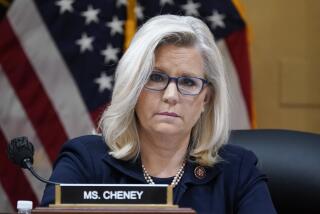Has Cheney Turned Into a Liability?
Is Vice President Dick Cheney an electoral liability for President Bush? Some top Republicans are reportedly worried that Cheney’s actions might threaten Bush’s bid for reelection in 2004.
The dump-Cheney talk probably originated with disgruntled State Department folks, who would like nothing better than to undermine the neocon foreign policy cabal headed by Cheney and Secretary of Defense Donald Rumsfeld. The movement’s underlying premise is that the vice president’s hawkish positions and statements related to terrorism, Iraq and foreign policy have put Bush at risk.
But even as more Republicans criticize the handling of postwar Iraq, international issues are only half the story. Another problem is Cheney’s failed stewardship of the administration’s domestic agenda in Congress, which also leaves the president vulnerable next year.
Cheney is the administration’s chief legislative officer, responsible for shepherding its priorities through Congress. He’s a regular presence at the weekly Senate Republican policy lunches. He also is the first vice president to maintain offices in both chambers. As a former House minority whip, Cheney is surpassed by few in knowing what makes the institution run.
Despite Cheney’s unprecedented ties to the other end of Pennsylvania Avenue, Congress has publicly rebuffed the administration on a series of legislative matters. Barring late reversals, the White House defeats will include changes in overtime regulations, the FCC’s ruling on media consolidation and the end of the travel ban to Cuba, despite veto threats from the president.
Other bills, such as Washington, D.C., school vouchers s and Head Start funding, have passed the House by a single vote. Several judicial nominees, such as Charles Pickering, have yet to win Senate confirmation.
Cheney’s role in pushing the administration’s agenda isn’t likely to get any easier. Heading into 2004, all House members and one-third of the Senate are up for reelection. Although they want a second Bush term, they’ve got their own reelections to think about. As Cheney’s batting average on Capitol Hill drops, moderate Republicans are straying from the White House line. Even reliable members of the GOP caucus are abandoning ship on issues such as the Cuba bill. When that happens, the White House knows it’s in trouble. Of course, not all of the fault lies with Cheney. The White House dispatches other advisors to make its case on Capitol Hill. Party leaders such as Bill Frist in the Senate and Tom DeLay in the House share the blame.
But Cheney’s own actions have made him an unusually inviting target. He snubbed Congress and the General Accounting Office by refusing to answer questions about his energy task force. The panel, which came under fire for meeting with industry groups, helped shape the administration’s energy agenda. The uncontested bid by Cheney’s former employer, Halliburton, to restore Iraq’s oil industry left a bad taste in the mouths of lawmakers whose districts contained other energy companies. Democrats have attacked Cheney’s nearly $500,000 in deferred compensation from Halliburton.
The vice president’s experience in Washington was supposed to balance Bush’s lack of expertise in that area. If Cheney, who was elected six times to Congress, can’t hold together a GOP Congress for a Republican president, perhaps Bush needs to tap someone else for the job.
In the campaign, Bush needs to be able to point to accomplishments other than his management of Iraq, especially if the death toll continues to rise and his approval ratings continue to drop. With Cheney focusing so much of his attention on terrorism and Iraq, perhaps the vice president has lost sight of Bush’s legislative agenda. If so, Cheney may prove to be a bigger domestic liability to Bush than he is a foreign policy burden. Bush will have to decide whether he can afford both worries.
More to Read
Get the L.A. Times Politics newsletter
Deeply reported insights into legislation, politics and policy from Sacramento, Washington and beyond. In your inbox three times per week.
You may occasionally receive promotional content from the Los Angeles Times.










